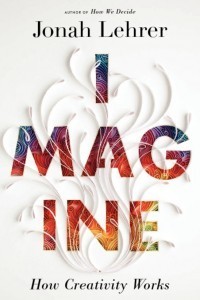The Secret of Creativity
(This is a guest post by Anna Bird of the Marketing Leadership Council, our sister program for heads of Marketing.)
 I recently saw a lecture by Jonah Lehrer, the Wired blogger and author of How We Decide about his latest book: Imagine: How Creativity Works. He explores the seeds of creativity, covering a broad range of research on the topic and sharing findings from the wacky (blue walls and collective bathrooms foster creativity) to the practical (individual feedback is usually more effective than group brainstorming sessions).
I recently saw a lecture by Jonah Lehrer, the Wired blogger and author of How We Decide about his latest book: Imagine: How Creativity Works. He explores the seeds of creativity, covering a broad range of research on the topic and sharing findings from the wacky (blue walls and collective bathrooms foster creativity) to the practical (individual feedback is usually more effective than group brainstorming sessions).
Two themes particularly interested me:
What distinguishes creative geniuses from everyone else
What leads to those moments of insight when you suddenly have a great idea
First, Lehrer looks at new research on what distinguishes creative geniuses (Picasso, Einstein, Beethoven etc.) from the rest of us – and shares some pretty surprising findings.
These people don’t stand out from the average population in terms of IQ. They might not even do better at traditional creativity tests. The key factor that sets them apart? “Grit” — persistence and passion for long-term goals. Grit is the ability and willingness to stick at something far longer than the rest of us – in spite of disappointment and difficulty. The most talented people tend to be focused to the level of obsession. Beethoven, for example, would try as many as 70 different versions of a musical phrase before settling on the right one.
“Grit” is a better predictor than IQ of:
Who’ll win a spelling bee
Which Ivy league students will get the best test scores
Who’ll survive the first summer at the US Military Academy
Which children will end up performing well at school
The second theme that intrigued me was the exploration of moments of insight. We’ve all had that experience of struggling with a problem for hours on end and then suddenly experiencing an epiphany… the answer comes to us out of the blue.
New research has shed light on how this works via word pairing tests in which participants are asked to find a word that links 3 other words, e.g., Apple links Crab, Sauce, Tree. This research has found a few common patterns.
First, when the answer comes to us it just feels right – we instantly sense that this is the solution.
Second – and more surprisingly – before we come up with the solution, we can actually tell how close we are to getting there. We don’t know the answer, but we can accurately predict whether we’re nearly there – or nowhere near. But it’s really important. It helps us know when we need to take a break or change tack vs. keep plugging away.
Third (and related to #2), that insight often comes to us once we’ve stopped consciously thinking about the problem – maybe in the shower or walking home for instance.
But there’s a link between this research on moments of insight and the research on grit. When that insight comes – and it feels like it was out of the blue – it wasn’t. Even if we have our revelation while in the shower and not thinking about the problem, the time spent reflecting on the issue beforehand will have helped.
Newton’s discovery of the theory of gravity is a great example of this. The popular version focuses on that spontaneous moment of genius when the apple fell. But Newton’s own explanation is almost the exact opposite: “I thought continuously until I reached the answer.” To make Edison a little more accurate then – genius is 90% perspiration followed by 10% inspiration.
SEC Members, learn more about using creativity and innovation to unstick stalled deals – check out our Ideation Toolkit, which helps you generate new ideas for moving deals forward, as well as our research on Manager Innovation.
Brent Adamson's Blog
- Brent Adamson's profile
- 9 followers



